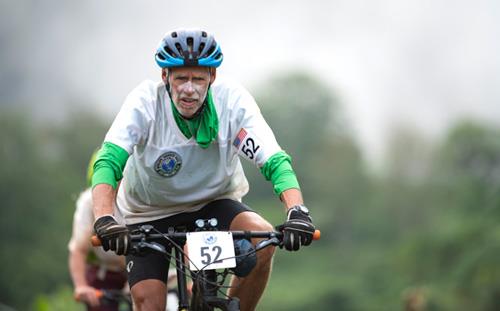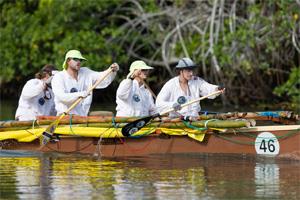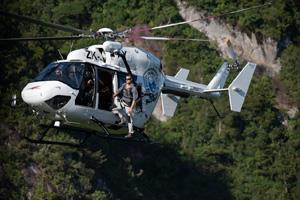
There's a revealing moment toward the end of the second hour of Amazon Prime Video's World's Toughest Race: Eco-Challenge Fiji that neatly sums up what this often-gripping reality-adventure series is all about.
A 30-year veteran of adventure races (top), racing for the first time with his now-grown son — who grew up admiring his father's feats and vowed to follow in his father's muddy tracks one day — is slowly feeling the effects of early-onset Alzheimer's, despite a lifetime of being physically fit and leading a good, clean life. His son is the leader of the four-man Team Endure, one of several American teams competing in the grueling,11-day, 400-mile grind across Fiji's chain of islands.
Every one of the more than 60 four-person teams from around the world has a personal story of some kind. Another team, comprised of recovering injured combat vets from US wars in Afghanistan and Iraq, features a female ex-soldier seriously injured in an IED explosion. She's been deaf ever since and admits it was hard to adjust from being a resilient, self-reliant woman dominating a man's world to being physically and emotionally rudderless while recovering from her injuries; expedition racing, she says, has given her a new lease on life.
Another American team, from Bend, Oregon, jumps to the front of the pack at the start of the race, but their strongest, tallest, most imposing team member has been laid low by fatigue and heat exhaustion after miles of rowing a four-person outrigger canoe over the open Pacific. The exertion has taken its toll, and his team is now paying the price. In adventure races, "All for one and one for all" isn't just an empty saying.
All four team members must check in at the mandatory checkpoints along the way, or the entire team is disqualified.
 There's genuine tension in these early moments. The stricken racer's teammates have to drag him — literally pulling him on a tether at one point — over jungle terrain and up a river canyon in the dead of night just as a tropical storm is roaring in off the equatorial Pacific.
There's genuine tension in these early moments. The stricken racer's teammates have to drag him — literally pulling him on a tether at one point — over jungle terrain and up a river canyon in the dead of night just as a tropical storm is roaring in off the equatorial Pacific.
That storm temporarily wreaks havoc on the entire race and forces race organizers to briefly suspend the competition. More than 200 expedition racers are scattered over a jungle area loosely equivalent to the state of New Jersey — at night, trapped in box canyons, surrounded by jungle ravines, some hacking their way through vine-choked jungle trails in the dark while others cling to the side of a wet, damp mountain.
A racing team from Estonia, the only team on a jungle river as the storm moves in — other teams have been told to get the (heck) out of there and hunker down before it's too late — is out of reach of rescue helicopters. Not even the most hardened pilot would consider flying in these conditions, especially at night.
"There is some fun," one of the Estonian racers says at one point, philosophically. "There is some suffering. There are some dark places that you go. What could be better?"
It's the small, personal moments that make Eco-Challenge so compelling to watch, though.
And it doesn't get much more personal than a grown man in his older years, a man who's lived a rugged outdoor life since early childhood, admitting he can't even zip up his own jacket anymore. Alzheimer's is the ultimate leveler. His son, keeping his composure, helps his father as best he can, gentle and kind.
Eco-Challenge is the brainchild of Survivor producer Mark Burnett. Back in 1996, when one of the early races made its TV debut on the Discovery Channel, Eco-Challenge became the program that made Burnett and co-producer Lisa Hennessy's names.
Like Burnett's better-known, more widely watched Survivor, Eco-Challenge focuses on the personal, individual stories rather than the act of survival itself.
 There the comparisons end, however. Eco-Challenge is real, dangerous, and potentially deadly. One reason for the 18-year hiatus between seasons is that race organizers wanted to nail down safety concerns once and for all, after a brush with disaster in 2002. Eco-Challenge makes for nail-biting, compelling TV, but it's no good if an expedition racer ends up being killed.
There the comparisons end, however. Eco-Challenge is real, dangerous, and potentially deadly. One reason for the 18-year hiatus between seasons is that race organizers wanted to nail down safety concerns once and for all, after a brush with disaster in 2002. Eco-Challenge makes for nail-biting, compelling TV, but it's no good if an expedition racer ends up being killed.
A number of former and present-day adventure racers have grumbled on Amazon's comments page that this TV Eco-Challenge is a disappointment, in part because the emphasis is on the human stories more than the nitty-gritty of actual adventure racing.
They miss the point.
For the casual viewer — the viewer who's looking for something to watch at night, if only to take their mind off the horrors of the day — it's the stories about courage and loss, regret and redemption, that uniquely human determination to beat the odds, find the will to live and start life all over again, that count.
The host is Bear Grylls, and while he's easy to dislike at times — some of his commentaries come across as smarmy and self-serving, at least to these ears — it's not about him. Grylls may be a household name in outdoor-survival circles, but Eco-Challenge is about the everyday, working men and women determined to test themselves against the elements. It's not about the media star at the center of the TV spotlight; it's about the athletes and would-be adventurers who can be forgiven for wondering why they've foregone the safety of home to hack their way through tropical jungle in the dead of night for 11 straight days of little food, extreme discomfort, and sleep deprivation.
At the end of the second hour, teams from New Zealand, Canada, Australia, and Spain are at the head of the pack. (This is not a spoiler; there are ten episodes in all, and hundreds of miles to go before those teams still in the race reach the finish line.)
The New Zealanders, veterans of countless expedition races over the years and past winners of Eco-Challenge expedition races, are heavy favorites to repeat.
There are no favorites where nature is concerned, though. If expedition racing teaches one thing — participant and viewer alike — it's that, no matter how much one prepares, there will always be surprises. Resilience is what counts. Adventure races favor those who learn how to deal with adversity under pressure. And adversity doesn't come more intense or pressure-ridden than Alzheimer's.
"To do this race with my dad is a priceless, once-in-a-lifetime opportunity," the afflicted racer's grown son says.
"That's the only thing I can do," the older man says dryly. "Run up hills. It's the only talent I have."
"Entertainment the entire family can enjoy" is an overused expression, but in this case, it fits like hand to glove. An outdoor tactical glove, yes, but a glove just the same. Reality-TV has never seemed more real.